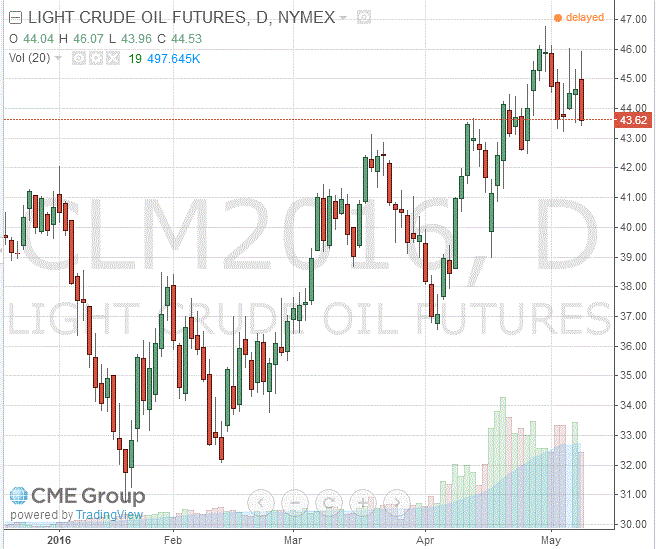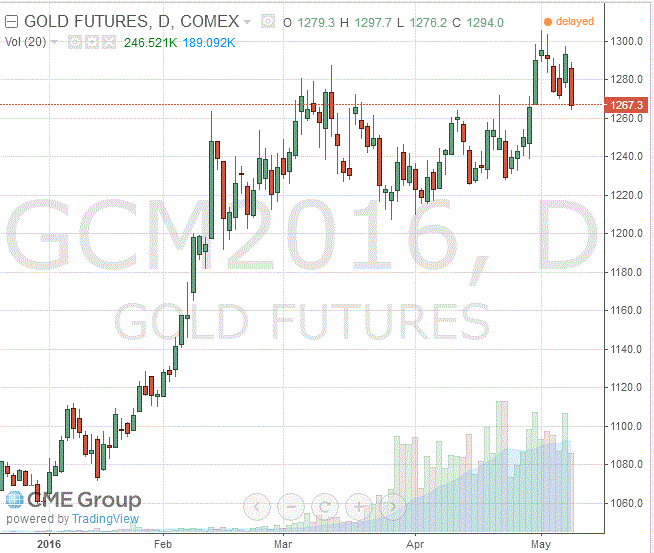Noticias del mercado
-
17:44
Oil quotes show negative dynamics
Oil prices dropped significantly today amid reports of a weakening of forest fires in Canada, as well as data reporting the increase in oil inventories in Cushing terminal.
Experts point out that the damage caused by fire to oil facilities is limited, and if some of the objects and closed, for the evacuation of personnel. Light rain and reduced air temperatures in Alberta have also limited the spread of fire.
Pressure on the quotes also provides that the number of long speculative positions in WTI crude oil remains at its highest level since the summer of last year, and the number of similar items for Brent crude oil rose to near record levels. Oil prices rose by more than 70 per cent after reaching 12-year lows around $ 27 or less in the first quarter, supported by the fall in US production, unexpected supply constraints from Libya, North and South America, as well as a weaker dollar.
In addition, the firm Genscape reported today that oil inventories in Cushing terminal rose by 1.4 mln. Barrels. Recall, according to the US Department of Energy, US crude oil inventories rose last week by 2.8 million barrels to a record high of 543.4 million. Barrels.
Investors also continued to analyze Friday's report from the oilfield services company Baker Hughes, which showed that the number of active drilling rigs for oil production in the US dropped from 30 April to 6 May to 328 units from 332 units, which is almost 80% less than the record high recorded in October 2014 (1609 units). The last reading was also the lowest since the end of October 2009. The number of gas production plants was reduced to 86 units from 87 units. Meanwhile, the total number of drilling rigs (oil and gas) fell by 5 units to 415 units, while writing the 19th consecutive weekly decline and reached a 41-year low.
In focus were also news that the post of oil minister of Saudi Arabia, instead of Ali al-Naimi was appointed Khalid al-Falih. Today, the new minister said that Saudi Arabia intends to continue the current policy in the oil sector. "Saudi Arabia will remain with its established policy in the oil sector. We remain committed to maintaining our role on the international energy markets and strengthen our position as the most reliable supplier of energy in the world "- said al-Faleh.
WTI for delivery in June fell to $43.62 a barrel. Brent for June fell to $43.92 a barrel.
-
17:21
Gold is much cheaper now
Gold prices fell nearly 2 percent, updating the minimum of the month, which was caused by increased demand for the US dollar and profit-taking after Friday's rally.
Recall, on Friday, gold has risen in price against the background of a weak US market report, which showed that in April, the economy added the fewest jobs in seven months. Against this background, it increased the likelihood that in the coming months, the Fed will refrain from tightening monetary policy in anticipation of stronger growth indicators of the US economy and the global economy. Recall, low interest rates support gold prices, which does not bring interest income to investors. The increase in rates, in turn, would contribute to the growth of the dollar and have reduced the demand for gold.
"The dollar has started to recover gradually reason why the dollar has not got a massive sell-off after data on the labor market, also made some investors nervous about the positioning of gold." - Said an analyst at ABN Amro Georgette Boele.
The dollar index, which reached a 16-month low last week, rose 0.3 percent today, showing a rather muted reaction to the mixed employment report. Strengthening of the dollar contributed to the statements of the President Federal Reserve Bank of New York William Dudley. He noted that the Central Bank may still raise interest rates twice this year. He also said that the employment data do not signal that the US economic recovery got away from the course on the eve of the next meeting of the FOMC, which will be held June 14-15. Also today, the Federal Reserve Bank of Chicago President Charles Evans said that the fundamentals of the US economy are "solid" and growth this year should accelerate to about 2.5 percent. However, Evans said that although the US economy looks healthy, he would still like to see more tangible evidence that inflationary pressures are strong enough to achieve the inflation target. "In my opinion, it is reasonable to continue to sit on the fence" - said Evans.
A slight influence also had the data of the Central Bank of China, which showed that the gold reserves in the end of April amounted to 58.14 mln. Troy ounces compared to 57.79 million. Troy ounces at the end of March.
The cost of the June gold futures on the COMEX fell to $ 1267.3 per ounce.
-
11:13
Saudi Arabia’s new minister of energy Khalid al-Falih: Saudi Arabia will continue its policy in the oil sector
Saudi Arabia's new minister of energy Khalid al-Falih said on Sunday that the country would continue its policy in the oil sector.
"We remain committed to maintaining our role in the international energy markets and strengthening our position as the most reliable supplier of energy in the world," he said.
al-Falih replaced the oil minister Ali al-Naimi.
-
11:07
Saudi Arabia replaces the oil minister Ali al-Naimi
Saudi Arabia replaced the oil minister Ali al-Naimi by Khalid al-Falih, chairman of the Saudi Arabian Oil Company, was also in focus. Al-Naimi held the post from 1995.
-
10:45
The number of active U.S. oil rigs declines by 4 rigs to 328 last week
The oil driller Baker Hughes reported on Friday that the number of active U.S. oil rigs fell by 4 rigs to 328 last week. It was the lowest level since October 2009.
The number of gas rigs declined by 1 to 86.
Combined oil and gas rigs decreased by 5 to 415.
-
10:09
China's trade surplus widens $45.56 billion in April
The Chinese Customs Office released its trade data on Sunday. China's trade surplus climbed to $45.56 billion in April from $29.86 billion in March from $32.59 billion, exceeding expectations for a rise to a surplus of $40.00 billion.
Exports fell at an annual rate of 1.8% in April, while imports slid at an annual rate of 10.9%, the seventeenth consecutive decline.
-
02:52
Commodities. Daily history for May 6’2016:
(raw materials / closing price /% change)
Oil 45.70 +2.33%
Gold 1,288.90 -0.39%
-

